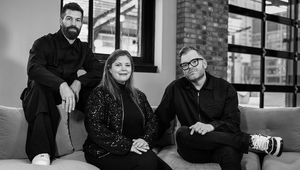
All In Musings: A Trans Perspective on International Transgender Day of Visibility

Throughout the US over 300 different pieces of legislation attacking LGBTQ+ people have been introduced or enacted. These recent laws have resulted in the banning of education on sexual orientation and gender identity, the restriction of trans athletes, and, as is the case with Texas, potential incarceration for familial support of transgender minors.
With so much happening it can be hard to remember the human beings most affected by these laws. In recognition of the continued struggle that LGBTQ+ folks continue to face, Remy Connors, senior data engineer from Arnold Boston, gives a look into their life as a trans, nonbinary person navigating this tumultuous time and reflects back on what the International Transgender Day of Visibility at the end of March meant to them.
Necko Fanning, director of DEI, Havas New York (NF)> Remy, thanks for sitting down to have this chat with me. To start off, I know you use they/them pronouns. Can you quickly explain for folks what it means to be a trans person as well as a non-binary individual, and how those identities intersect and are different?
Remy Connors, senior data engineer, Havas Boston (RC)> Sure! As you said, I am a trans nonbinary person who uses they/them pronouns. Being transgender is to have a disconnect between the gender you self-identify with and the body you were born with – whether that manifests as dysphoria (negative feelings about that disconnect) or euphoria (positive feelings when you’re able to successfully make your gender identity match how you’re presenting yourself to the world) depends on the individual.
Society is very binary in how we perceive gender – for most people, you’re either a man or a woman, and you present yourself accordingly. However, there is a percentage of people, like myself, who don’t perceive themselves to be either, or who feel like they fit into both in some way but not one or the other entirely. Nonbinary is not a ‘third gender’ but rather everyone who falls outside the typical societal binary. Some folks will still use binary pronouns alongside neutral ones (she/they or he/they) and that comes down to personal preference; since I personally don’t feel that either fit who I perceive myself as, I prefer to stick with they/them.
Where they intersect is where you realize the vast spectrum of nonbinary identity. Some enby (umbrella term for gender identities that can’t be exclusively categorized as man or woman) folks consider themselves trans; some don’t. Some take medical steps to move themselves closer to an ideal presentation; some simply choose to use style to present themselves differently; and some folks don’t change their presentation at all. I decided to go a specific medical route, and as with everyone, my reasons for doing so were very personal and particular to me. It’s a huge spectrum of possibility and with societal support we could be giving folks with different gender identities the ability to live their best, fullest lives.
NF> International Trans Visibility Day (ITDOV) was a several weeks ago and now we’re celebrating Pride Month. Can you tell me a little bit about what ITDOV meant to you as a trans person and, more broadly, what it means to have a day meant for international visibility?
RC> ITDOV is an important day to be loud every year to normalize our existence. Personally, I think it should be longer than just a day, and I think more should be done by cis folks to recognise the struggles we as trans people, especially BIPOC trans women, suffer through on the regular. Especially when in some places, being visible is still a risk unsafe to take. It’s nice to get back-pats and “Happy you day!” from coworkers and friends, but as a relatively comfortable trans person, I feel that more could be done to help and support our trans siblings who aren’t as safe or comfortable.
NF> Pride Month is a great opportunity to talk about more “dos and don’ts” regarding trans folks. We’ve chatted before about how simple it is to recover from accidentally misgendering someone but perhaps you can give us a few more insights? What are some “don’ts” when interacting with trans folks? What are some “dos”?
RC> Definitely! I feel that we always focus on ‘what to do when you mess up’ and not ‘how to be kind and complimentary’ and the latter is so important when it comes to making trans folks feel safe and included.
Got a trans coworker who is trying out a new style or haircut? Be proactive! Tell them they look great!
Struggling with pronouns or a new name? Repeat them out loud to yourself and take the time to correct other people who get it wrong.
Be supportive! I know a lot of cis folks are very tentative because they feel that not talking about it at all is better than messing up and getting it wrong but speaking up is so important. I want to give, what I feel is, the perfect example of being supportive in a way that takes little effort yet is still super meaningful.
When I announced to my office that I was going to be changing my name and going out for a surgery that would change my body visibly, I received countless messages of support, which was great – but something I’ll never forget was when someone from the executive leadership team blasted a “HELL YEAH REMY!” to the entire office in response, then sent an individual message to me as a follow up with a specific expression of support. Being loudly supportive of trans issues from a position of power carries weight, especially when that message is shouted to everyone you interact with during the day. (Thanks George!)
NF> ITDOV came at a time this year when both the US and UK are seeing strong political anti-trans legislation and actions. Sadly, that hasn’t changed two months later. In the US it feels as if the LGBTQ+ community at large—and specifically the trans community—is under attack. In the UK, the government walked back its decision to include trans folks in the ban on conversion therapy. As a trans person, what is it like waking up in a world where these decisions are being made?
RC> It’s bad. It’s really bad. I feel like I can’t wake up without seeing some new piece of harmful legislation coming from somewhere I know people are already struggling. Missouri, where I lived previously, is considering a law that will deprive trans people of treatment until age 25. As if to add insult to injury it feels like this isn’t on most people’s radar at all. With so much other awful stuff going on in the world, how do you focus on everything, everywhere, all the time?
I have so much trouble getting through my day-to-day life acting like everything is cool and normal when I know the only reason I’m personally not experiencing this level of discrimination is just because of the State I happen to live in. Even simple things, things I used to love, like Harry Potter are now colored by anti-trans sentiments. I can’t look at a Harry Potter book or hear anyone talk about it without constantly being reminded that these are the same works whose author is leading the charge against trans people in the UK. Trans Day of Visibility is great, but it sometimes feels like a blip in the collective consciousness compared to the daily struggles of living, breathing people.
NF> A big topic of debate as of late has been trans participation in sports. The argument coming from anti-trans folks is that—particularly with MTF (male to female) trans athletes—that there is an unfair advantage. Current stances from the medical community are that there has been no “direct or consistent research suggesting trans individuals have any athletic advantages”. What do you think folks need to remember or know when talking about trans athletes?
RC> Folks need to remember that the root of this debate has two axes; it’s not just transphobia, but misogyny. We see this with athletes like Caster Semenya, who is a cisgender woman with who has ‘naturally high-occurring levels of testosterone’ that has been disqualified from events because of this. In sports, as with many things, it can seem as if anyone who doesn’t fall into a cisgender, heterosexual understanding that men “should” be stronger than women, suffers. This is before we even consider the medical effects of hormones on transitioning individuals. I always think of my best friend and workout buddy, who suddenly wasn’t able to easily maintain her muscle definition due to testosterone blockers working their magic.
A great example of this being handled well was the case of Harrison Browne, a trans male player for the National Women’s Hockey League. He came out while still playing but agreed to forgo his hormone regimen until his contract was complete. Socially, his identity and presentation were respected – he/him pronouns – and once he started physically, purposefully transitioning towards masculinity, playing in the women’s league was no longer appropriate.
Ultimately, at the end of the day, it’s sports – it’s entertainment – and a large part of that should be a celebration of what people can do at their most fulfilled despite the obstacles in their way to get there. If a trans woman can compete with the best despite what her body is going through, there’s absolutely no reason not to celebrate that.












